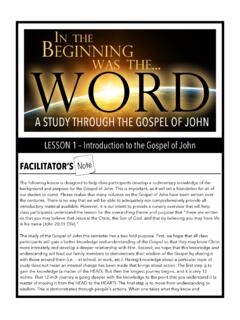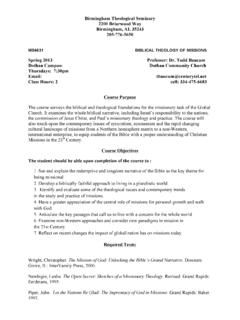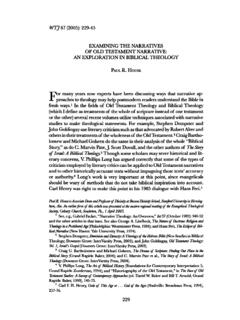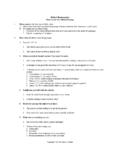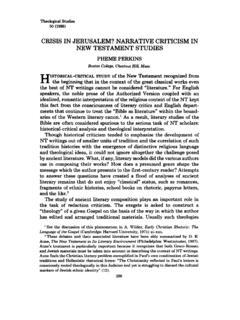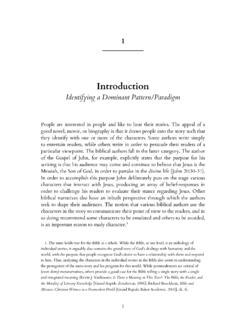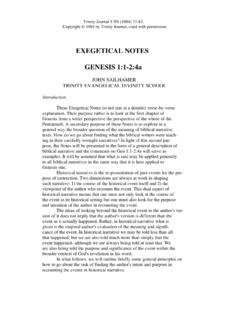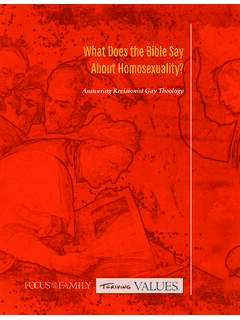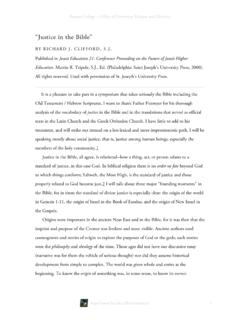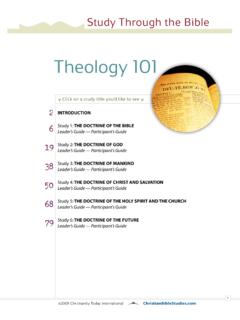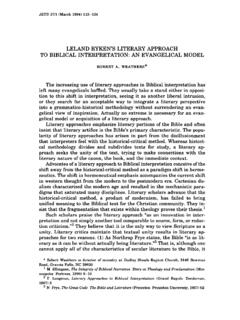Transcription of Supplemental Lesson one What is the Christian Story
1 1 Supplemental Lesson one: what is the Christian Story ? Facilitator Note This Lesson centers on the unity of God s Word by exposing the overarching Story of redemption found in the Bible. Spend time reading through and praying over this Lesson . Consider the ways in which you have struggled viewing the Bible and where you fit in the grand scheme of God s Story . Spend time expressing to the class that God has always had a plan to redeem His people and that they are a part of that plan and have an important part in God s Story . Prayer Spend time in prayer with the class. Allow for requests and center your prayer on this Lesson . Lesson I. what basic elements make up a Story ? Five Essential Elements of a Story 1. Characters Characters are the individuals that the Story is about. In most stories the author provides a detailed description of each of the characters so that the reader can visualize each person. There is typically a main character that determines the way the plot will grow and develop.
2 The main character usually solves the problem that the Story centers around. However, the other characters play a part in either creating the problem or helping to solve it. The author typically develops the characters through the entire Story , yet they remain true to their parts throughout. 2. Setting Setting is where the Story takes place. The author usually describes the environment that the characters find themselves in so that the readers can visualize where the characters are and what they see around them. Describing the setting helps the readers feel connected with the characters and the plot. 3. Plot The plot is the Story itself. The entire book is based on the plot. With any plot there must be a very clear beginning, middle, and end. The author must make clear each part of the plot by providing the necessary descriptions. This helps the reader make sense of the actions of the characters and helps them follow along from start to finish.
3 4. Conflict Conflict is found in every Story . The plot centers on this conflict and how the characters work to resolve the problem. The Story becomes most exciting right before the resolution. This is called the climax of the Story . 5. Resolution Resolution happens when the characters (usually the main character) discover the solution to the conflict. The resolution must fit the rest of the Story and solve all parts of the conflict. 2 II. Why are stories important? All of us find ourselves intrigued by a good Story . Think about all the books we read, TV shows we watch, and the movies and plays we see. Since people began drawing pictures on cave walls we have been drawn to stories. Why do stories matter? what is it that pulls us into a Story ? o Stories provide us meaning. This meaning helps us understand the world around us. Otherwise, what does it all matter? what would be worth fighting for? Why get up in the morning if there is no meaning in life?
4 O People want to know that things matter and have purpose. More importantly, people want to know that they matter and that they have a purpose. This is woven in our DNA. o Our life is a Story and we want to know that our Story has meaning and purpose. But our Story is but one in the midst of many and that often leaves us confused. We wonder how we fit into the larger Story and whether or not we matter in the grand scheme of things. o Yet, what we think and how we live is largely determined by the larger Story in which we interpret our lives. The real question is, which larger Story do we choose to find ourselves in? III. Is there one Christian Story or a bunch of unrelated stories? Many people believe that there is no grand Story for our lives that binds everything together. Instead, they believe we all just live our lives and one day we die and that is it. With this lens (or should I say Story ?) they view God s Story as a bunch of unrelated stories that provide no meaning for lives today.
5 They do not believe there is one Story in the Bible. Others believe that the Bible is from God, but would agree that the Bible is filled with unrelated books that can give us some insight into God and give us some examples of what God expects and how to live, but it is often confusing and even seemingly contradictory. They approach the Bible looking for answers for how to live, but don t believe that it can possibly tell us one Story because it was written by many authors over many years. However, there are others who firmly believe that the God s Word did not come to us by chance and in an unrelated fashion. Instead, they believe the Bible communicates one Story from God that spans the centuries of human existence (a Story that binds all the stories together). To borrow and adapt a quote from Lord of the Rings : One Story to rule them all, One Story to find them, One Story to bring them all and in God s love bind them. 3 biblical Theology This approach to God s Word is called biblical Theology and it assumes there is unity in the Bible and that God is communicating a coherent Story of redemption to His children.
6 This approach allows the Bible (God) to tell the Story and to define the terms that will control our reading of it. biblical theology seeks to put individual texts in their historical context since what came before them is the foundation on which they are laid and what comes after is what they anticipate. Everything is connected and a part of a greater Story and plan. However, our typical approach to reading the Bible often does not allow for that. Usually, we approach the Bible from a sequential and chronological perspective. We simply follow the timeline of God s Story and try to determine what God is teaching us from the particular point in history. Doing so, we find ourselves opening up to a part of Scripture and trying to discover what it is saying to us without recognizing it within the framework of the larger Story of redemption. With this approach, everything is contained within its context without a notion as to how it fits into God s overall plan.
7 This leads us to look to the different stories and characters in Scripture as an example to us in some way. This is because we believe that the Bible is about us and therefore its use of these many stories and characters are present to teach us how we are to live. While there is some truth in that the stories and characters in God s Word can be examples to us, that is not God s primary objective in telling us these stories. Instead, He is trying to lead us to Him by showing us His plan to redeem us as He works it out through all of Scripture. You see, the Bible is not about us; it s about God and His plan to save us. Instead of taking this usual approach to Scripture, biblical Theology seeks to open up the unity of the Bible by exposing and collecting its major themes. It demonstrates the many ways in which the character of God the Father, Son, and Holy Spirit unite the diverse books and materials revealing to us a greater plan that was set forth by God since before time began.
8 Jesus Himself used biblical Theology to demonstrate how all of Scripture pointed to Him in Luke 24 on the road to Emmaus and to His disciples (read Luke 24:13-49). There, Jesus pointed forward and pointed backward in Scripture demonstrating how the whole of the Bible was God s revelation of His Story of redemption carried out through His Son and finds fulfillment when Jesus comes again. That is why biblical Theology is important. It s important because: 4 It gives us the means of dealing with problematic passages in the Bible by relating them to the one message of the Bible. It enables us to relate any Bible Story to the whole message of the Bible, and therefore to ourselves. It shows the relationship of all parts of the Old Testament to the person and work of Jesus Christ and, therefore, to the Christian . It enables us to map out the unity of the Bible by looking at its message as a whole . It provides the basis for the interpretation of any part of the Bible as God s Word to It understands all things as leading to and from something.
9 Ultimately, Christ as center. The Metanarrative: The Story Above the Stories With the new lens of biblical Theology, we are able to understand God s ultimate purpose as He gives us insight into the true meaning of all things. This Story above the stories allows us to approach and interpret Scripture and life as God intended. It allows us to discover how His plan has been worked out since before creation. Each and every Story of the Bible and our own lives begin to make sense and we see what part we play in that Story . Let s consider God s Story of Redemption in light of the essential elements we see in most every Story . Five Essential Elements of God s Story 1. Characters The author and main character of God s Story is GOD. Therefore, God determines the way the plot will grow and develop. In the end (and from the beginning) God solves the problem that the entire Story centers around. However, the other characters of the Bible play a part in either creating the problem or helping to solve it.
10 God develops the characters through the entire Story , yet they remain true to their parts throughout. 2. Setting The Bible s setting is the world, as we know it. While much of the Story happens on the three bodies of land around the Mediterranean Sea, the Story is in the whole world in which we live. God has provided the setting that gets at the meaning and purpose of this world, which He created, and the meaning and purpose of our lives. The world is God s theater and temple in which He demonstrates and displays His glory. God creates and describes this setting to help us feel connected with Him, the characters and their stories, and the plot of His Story . 1 Graeme Goldsworthy, According to Plan: The Unfolding Revelation of God in the Bible (Downers Grove: IVP Academic, 1991), 21-25. 5 3. Plot The plot of God s Story will be describes in more detail below. However, it can be summarized in four words: Creation, Fall, Redemption, and Restoration.

